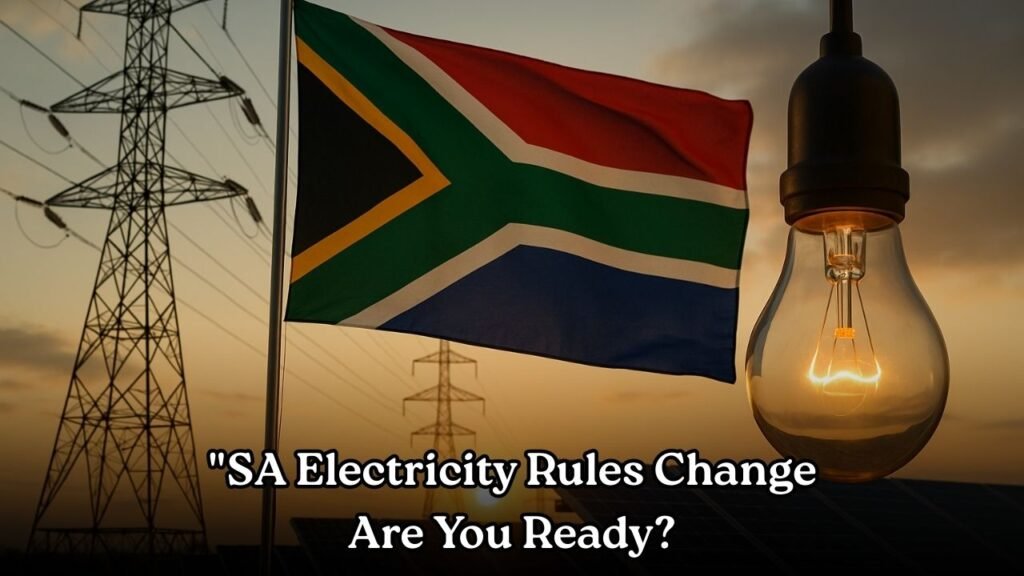South Africa 2025 Electricity Laws – South Africa is preparing for major changes in its electricity laws, set to take effect this September 2025. These changes aim to modernize the country’s power sector, improve energy efficiency, and ensure better consumer protection. The government has announced stricter regulations for electricity tariffs, aiming to balance affordability with sustainability. Consumers can expect more transparent billing practices and clear guidelines on meter readings, while utility providers will have to comply with new reporting and accountability standards. Additionally, the laws emphasize promoting renewable energy sources and reducing carbon emissions, which could lead to incentives for households installing solar panels or other clean energy systems. Industry experts suggest that these changes may initially cause minor adjustments in electricity bills but will ultimately benefit consumers by ensuring a more reliable and environmentally responsible power supply. Staying informed about these legal updates is essential for all South Africans to avoid penalties and maximize potential benefits from renewable energy incentives. Reliable sources like the [Department of Mineral Resources and Energy](https://www.dmr.gov.za) provide detailed guidance on these new regulations.
New Tariff Structures and Consumer Protection Rules
Starting September 2025, South Africa will implement revised electricity tariff structures designed to provide clarity and fairness to consumers. The new laws mandate that utility companies clearly display all charges on monthly bills, including fixed costs, usage-based fees, and additional service charges. Consumers will have the right to dispute any incorrect readings or billing anomalies, with regulators required to resolve complaints promptly. Importantly, vulnerable groups such as low-income households will benefit from subsidized rates, ensuring that electricity remains accessible for all. The laws also introduce penalties for unauthorized electricity disconnections and enforce stricter rules on pre-paid meter management. Energy experts advise consumers to review their contracts carefully and monitor monthly consumption to take full advantage of new protections. Additionally, these reforms encourage competition among electricity providers, potentially leading to more innovative services and cost-effective energy solutions. Detailed guidelines and FAQs can be accessed through the [National Energy Regulator of South Africa](https://www.nersa.org.za).
Renewable Energy Incentives and Grid Modernization
One of the most significant aspects of the 2025 electricity law changes is the promotion of renewable energy adoption. Households and businesses investing in solar panels, wind turbines, or energy storage systems may qualify for government rebates and tax incentives, reducing the initial installation costs. The laws also encourage micro-generation, allowing consumers to sell excess energy back to the national grid, creating an additional source of income while promoting sustainability. To support this shift, the government plans to modernize the electricity grid, incorporating smart meters, improved monitoring systems, and digital reporting tools. This modernization will improve reliability, reduce outages, and provide real-time data to both consumers and energy providers. Experts recommend that consumers explore renewable energy programs early, as application windows for incentives may be limited. Information on available rebates and grid updates can be found at the [Department of Environment, Forestry and Fisheries](https://www.environment.gov.za) and related renewable energy authorities.
Compliance Requirements for Electricity Providers
Electricity providers in South Africa must comply with stricter operational standards under the new 2025 regulations. These include regular reporting of generation capacity, grid reliability, and environmental impact. Providers are also required to implement advanced customer service systems to handle complaints, monitor consumption trends, and prevent fraudulent practices. Non-compliance can result in substantial fines, suspension of licenses, or legal action. The laws emphasize accountability and transparency, ensuring that both private and public electricity entities maintain ethical and efficient operations. Additionally, providers are encouraged to invest in renewable energy projects and improve infrastructure to accommodate growing demand. Industry analysts suggest that these measures will enhance consumer confidence, reduce energy theft, and improve service quality across the country. Providers and consumers alike are advised to regularly consult updates on compliance and regulatory changes from the [Energy Department’s official publications](https://www.energy.gov.za).
Consumer Preparation and Action Steps
With the new electricity laws coming into effect this September 2025, consumers must take proactive steps to prepare. First, reviewing current electricity contracts and billing statements can help identify any inconsistencies or areas for improvement. Installing energy-efficient appliances and considering renewable energy solutions can reduce costs and maximize benefits under the new regulations. Consumers should also familiarize themselves with complaint procedures and consumer rights, which now include faster dispute resolution and protection from unfair billing practices. Joining local energy forums or subscribing to updates from regulatory authorities will keep households informed about tariff changes, incentives, and grid modernization projects. Understanding these laws and acting early ensures that consumers not only comply but also take advantage of opportunities to save money and contribute to a sustainable energy future. Full details and guidelines are available from the [South African Government News Agency](https://www.sanews.gov.za).





